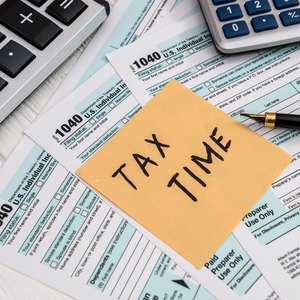
All income you receive is usually subject to income tax, but there's at least one notable exception. You won't owe income tax on the economic impact payments you probably received in 2020 and 2021 under the terms of the Coronavirus Aid, Relief, and Economic Security (CARES) Act or the American Rescue Plan Act. This money was literally a gift from the federal government designed to stimulate the economy during the COVID-19 pandemic.
What Are Economic Impact Payments?
Economic impact payments were often referred to as stimulus checks, but they weren't all sent out in paper form. Payments were made electronically to most taxpayers. They arrived as direct deposits into the same bank account where taxpayers received their tax refunds, or from which they electronically made tax payments in previous years for balances they owed.
The wording of the IRS’s description of these payments has understandably led to confusion. The government agency initially referred to them as an “advance credit against the 2020 tax.” This makes it sound like it will cost you tax dollars down the road. But in reality, the IRS effectively issued you an early tax credit each time you received a payment. You didn't have to wait to receive it until you filed your tax return for the year.
Who Got Economic Impact Payments?
Economic impact payments were based on taxpayers' incomes. The IRS used the adjusted gross income on your most recently filed tax return.
You were automatically issued a payment of $1,200, or $2,400 if you were married and filing jointly if you didn’t file a tax return in 2018 or 2019. Additional payments of $1,400 or $2,800 went out in March 2021 under the terms of the American Rescue Plan.
You might have additionally received a "plus-up" payment after this if you hadn't yet filed your 2020 tax return when payments were calculated and sent out in March 2021, and if it turned out that you should have received more than what you actually did based on your income.
Here's the EIP you should have been issued based on your reported adjusted gross income on your 2018, 2019 and 2020 tax returns:
- Up to $75,000 ($150,000 for joint filers): Full payment of $1,200 ($2,400 for joint files)
- Over $75,000 ($150,000 for joint filers): Subtract $5 for each $100 over
- Over $99,000 ($198,000 for joint filers): Not eligible
EIP and Dependents
Taxpayers with dependents are entitled to quite a few tax credits and deductions, and this held true with economic impact payments as well. There was an additional small payment for each of your children if they lived with you, over and above the $1,200 per eligible adult. You should have received a $500 stimulus payment in 2020 for each child, but the child would have to qualify based on certain rules:
- Must have been age 17 or younger at the end of 2019
- Must have had a qualifying association with the taxpayer, such as a biological child, adopted child, stepchild, foster child, half- or step-sibling, grandchild, niece or nephew
- Was eligible to be claimed as a dependent on your tax return
- Was either a U.S. citizen, U.S. national or U.S. resident alien
- Had a taxpayer identification number, such as a Social Security number or an adoption taxpayer ID
Although taxpayers can claim certain dependents who are older than 17 on their tax returns, this doesn’t apply to the EIP. Only children aged 17 and younger will qualify for the additional $500.
Taxes on Economic Impact Payments
The 2020 and 2021 payments come with no tax consequences. “The payment is not income and taxpayers will not owe tax on it,” according to the IRS. The payments have been classified as a tax credit.
One rumor that circulated when the stimulus checks were first announced was that the money would come out of your 2020 or 2021 tax refunds. "The payment will not reduce a taxpayer's refund or increase the amount they owe when they file their 2020 tax return next year," according to the IRS. Your stimulus payment won’t be used to determine your eligibility for certain government programs, either.
Read More: Tax Credits: What Are They and How Do You Qualify?
Including Your EIP on Your Tax Return
You won’t suffer any tax consequences from receiving those stimulus payments, but you must still include the payments on your tax returns when you file. This would have been the case when you filed your 2020 Form 1040 in 2021, and you must do so again when you file your 2021 return in 2022 if you received a payment in March 2021. The IRS has published instructions online, along with some answers to common questions. Tax preparation software will walk you through the process as well.
Make sure you’ve retained the statement the IRS should have sent you, Notice 1444, "Your Economic Impact Payment." It would have been mailed to the last address the IRS had on record for you within 15 days of your payment being issued. You should keep that notice with your other income tax records so you can find it when you’re preparing your tax return.
Changes in Circumstances
The IRS has also said that you won’t have to return any of the money if your circumstances changed between the time you received the EIP and when you file your tax return. You might have received a $500 payment for a child you claimed on your most recent tax return, but the other parent will claim that child in the 2021 tax year. You would not have to return the $500 you received to the IRS in this case.
Claiming Missed Stimulus Payments
What happens if you never received your payment? You’ll have one last opportunity when you file your 2020 or 2021 tax returns if you missed the various deadlines and still don’t have your stimulus payments in hand. You can claim the missed payment as a recovery rebate credit on your return.
Tracing a Lost EIP
First make sure you were indeed eligible if you didn't receive one or any of the economic impact payments. Check the income requirements and make sure that you didn't exceed that threshold in the last tax return the IRS had on file for you.
You can conduct a payment trace if you find that you should have received a payment but didn’t. Call 800-919-9835, or mail or fax Form 3911, Taxpayer Statement Regarding Refund, to the IRS. The agency will check to make sure the payment was never deposited, then it will issue a replacement.
Social Security and EIP
Some U.S. residents aren’t required to file tax returns. The IRS might not have had a recent return to use in processing your payment if you received Supplemental Security Income, Social Security Disability or Social Security retirement income that wasn't taxable, or if you earned less than the reporting thresholds for that year that would have required you to file.
The IRS set up a tool for non-filers to make it easy to provide the information necessary to issue your payment, but that tool has since closed down. You’ll have to file a tax return for the 2020 and/or 2021 tax years to claim your credit in this case.
Read More: Can You File Income Taxes When You Receive SSI?
Paying Tax Debt
Many wondered at the time of the initial announcements whether the economic impact payments would automatically be put toward any back taxes they might owe. The answer is no. You should have received the full amount of the stimulus payout you were entitled to based on your adjusted gross income regardless of any tax debt you might have owed the IRS at the time.
Back Child Support and Other Creditors
COVID-19 has been tough on household budgets, and you may have fallen behind on your child support payments. Although the government has said that your stimulus money wouldn't be handed over to tax collectors or to resolve past tax obligations, child support is a different story.
Your economic impact payments could have been intercepted to pay that debt if you owed back child support at the time they were sent out. You should have received the portion that wasn’t used to pay your past child support debt if anything was left over.
Other debts you owe could end up costing you your stimulus payment, but this won’t happen directly. The IRS won’t hand your stimulus check over to a third party unless you owe past due child support. You're only at risk of losing your payment if you deposit it into a bank account that's then garnished by a creditor who might have taken you to court to collect the debt and gotten a garnishment order against you.
Leaders in some states have passed executive orders to keep that from happening, but it’s still a possibility.
References
- IRS: What People Really Want To Know About Economic Impact Payments
- IRS: Economic Impact Payments
- IRS: Economic Impact Payments: What You Need To Know
- IRS: Who Can Get More Economic Impact Payment Money for Children
- IRS: Economic Impact Payment Information Center — Topic J: Reconciling on Your 2020 Tax Return
- CNET: Deadline To Claim Your Stimulus Money This Year Is Passed. What To Do Now
- USA Today: Missing Your Stimulus Check? There's One Last Chance To Claim an Economic Impact Payment From the IRS
- IRS: Economic Impact Payment Information Center — Topic F: Payment Issued but Lost, Stolen, Destroyed or Not Received
- IRS: Taxpayer Statement Regarding Refund
- IRS: Economic Impact Payment Information Center — Topic I: Returning the Economic Impact Payment
- MarketWatch: Do I Have To Pay Back My $1,200 Stimulus Check? Don’t Fall for These 5 Myths About the Stimulus Payments
- IRS: Tips for Taxpayers Who Owe Taxes
- Forbes: Can Debt Collectors Grab Your Stimulus Check?
- U.S. Department of the Treasury: Economic Impact Payments
Writer Bio
Stephanie Faris has written about finance for entrepreneurs and marketing firms since 2013. She spent nearly a year as a ghostwriter for a credit card processing service and has ghostwritten about finance for numerous marketing firms and entrepreneurs. Her work has appeared on The Motley Fool, MoneyGeek, Ecommerce Insiders, GoBankingRates, and ThriveBy30.
